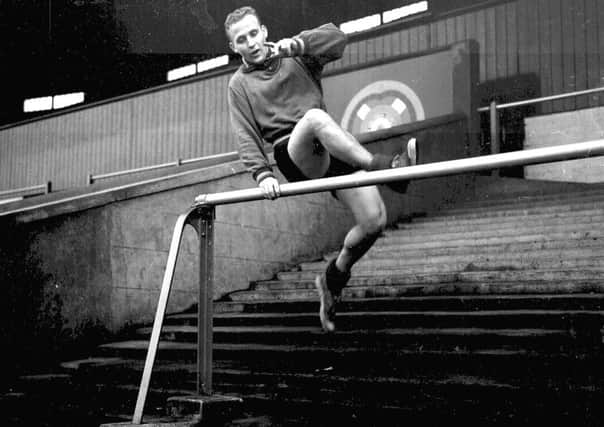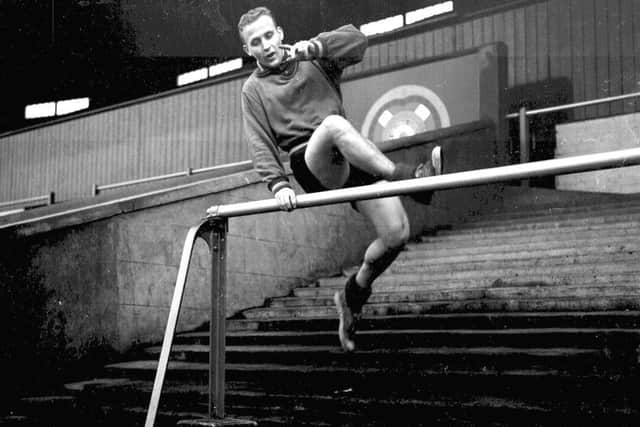Tributes paid to Hearts great Alex Young


But he did more than this, far, far more. He left for Everton, adding an English league championship to the two he won with Hearts in 1958 and 1960. He won the FA Cup, again replicating the success he had with Hearts in the Scottish equivalent. He also won League Cups while north of the Border, scoring in the Tynecastle side’s defeat of Third Lanark in 1959.
When football was still all about glory, Young, whose death aged 80 was announced yesterday, enjoyed more than his fair share.
Advertisement
Hide AdAdvertisement
Hide AdBut had he won none of the above, had he simply thrilled the huge crowds of the time with his ball skills and ability to glide over the turf, we’d have heard of him. We’d still be mourning him now.


If not one already, he certainly became a household name in 1968. He lent his nickname, the Golden Vision, to Ken Loach, who used it for the title of a kitchen sink drama/ documentary based around a trip to watch a Young-inspired Everton side play at Arsenal towards the end of the player’s career.
It was originally shown in the BBC’s Wednesday Play series and was an innovative blend of fact and fiction.
Some of the factual scenes involved a reflective Young – “Maybe next week someone comes along and bingo, you are transferred,” he ponders at one point – while members of his family also starred in some of them. Jane, his then five-year-old daughter, was given a cameo near the start.
“What does your Daddy do?” she’s asked.


“Plays football”
“Who for?”
“Everton”
“Is he good?
“Yes”
What’s his name?
“Alex Young.”
After he broke into the great Hearts side of the mid-1950s, originally as a winger, no one needed to ask this question of the (then) boy they dubbed the “blond bombshell”. Young, who made his debut at 18, was local for a start, having grown up just outside Edinburgh, the son of a Loanhead miner.
A poignant part of writing such pieces as these is returning to the contacts book to find ever fewer names able to share memories of a recently lost team-mate.
So it is with the Hearts team of this era. Dave Mackay died two years ago next month. Freddie Glidden is now the only surviving member of Hearts’ Scottish Cup-winning team of 1956.
Gordon Marshall, pictured below, broke into the side the following season. The goalkeeper, who had the honour of looking upfield for a mop of blond/golden hair at which to aim, is still going strong at the age of 77. He is stung by the news of his old team-mate.
Advertisement
Hide AdAdvertisement
Hide Ad“He got compared with Willie Bauld, but I’d say he was slightly better than Willie,” he said, the revered Bauld being a member of the Terrible Trio forward line made up by Alfie Conn and Jimmy Wardhaugh.
“Alex was so light on his feet, and quick. He proved just how great a player he was when he went south.
“If you could claim to be a friend of Alex Young, you got the freedom of Liverpool!
“When I went to Newcastle, I played against him,” added Marshall. “Newcastle and Everton always had some good games. But even at St James’ Park, you sensed the crowd expecting something when Alex got the ball. He was just a magician. With certain players, the whole crowd reacted – you could feel it.”
If there’s a sense Young was somehow less of a hero at Hearts than he was later to become at Everton, where there’s a lounge named in his honour, it s only because the fans of that time were spoiled for choice when deciding on whom to shower their affections.
“It was a hard act to follow, following Willie Bauld,” noted Marshall. “The records speak for themselves. The best inside trio was (Jimmy) Murray, Young and Wardhaugh. An awful lot of people go Conn, Bauld and Wardhaugh, but Murray, Young and Wardhaugh was the forward line that really set things up.”
They were all ball players, recalled Marshall. So the pressure was on the goalkeeper to find a man with a throw-out or kick. Full-back George Thomson, who joined Everton at the same time as Young in November 1960, would yell at Marshall: “We’ve won it now, let’s make sure we keep it!”
Marshall remembers Young as someone “who could handle himself”, while he also recalled his ability in the air. “He could just hang there,” he recalled.
Advertisement
Hide AdAdvertisement
Hide AdOne of the masters of this art, Alan Gilzean, added to the chorus of appreciation for Young yesterday. They played together while on national service at Willems Barracks, in Aldershot. Gilzean at inside left, Young at centre-forward. With Ron Yeats playing at the back, it wasn’t a bad side.
“He was always the golden boy,” said Gilzean, who described it as ”an absolute travesty” how few times Young was chosen for Scotland – just eight caps, in which Young scored five times.
But such minimal recognition was a familiar complaint at a time when many Scottish club sides were crammed full of players who could justifiably feel slighted by not featuring at international level. Bauld, for example, won only three caps, Conn just one.
For a spell Marshall could count not only Young but also winger Gordon Smith among his options when considering where to direct the ball.
“I was blessed,” he said. “I wouldn’t like to say who was best. Gordon was way up there, Alex was up there with him.
“All these players were capable of putting on a show. It really was an entertainment business in those days.”
The departure of Young robbed Tynecastle of some of the stardust. But Scotland’s loss was England’s gain, with his impact memorably articulated by Spurs’ double-winning captain Danny Blanchflower.
His words will be repeated again and again in the coming days and they deserve to be, because they beautifully sum up a footballer whose majesty lives on in the eyes of all those fortunate enough to watch him play.
“The view every Saturday that we have of a more perfect world, a world that has got pattern and is finite,” said Blanchflower. “And that’s Alex, the Golden Vision.”